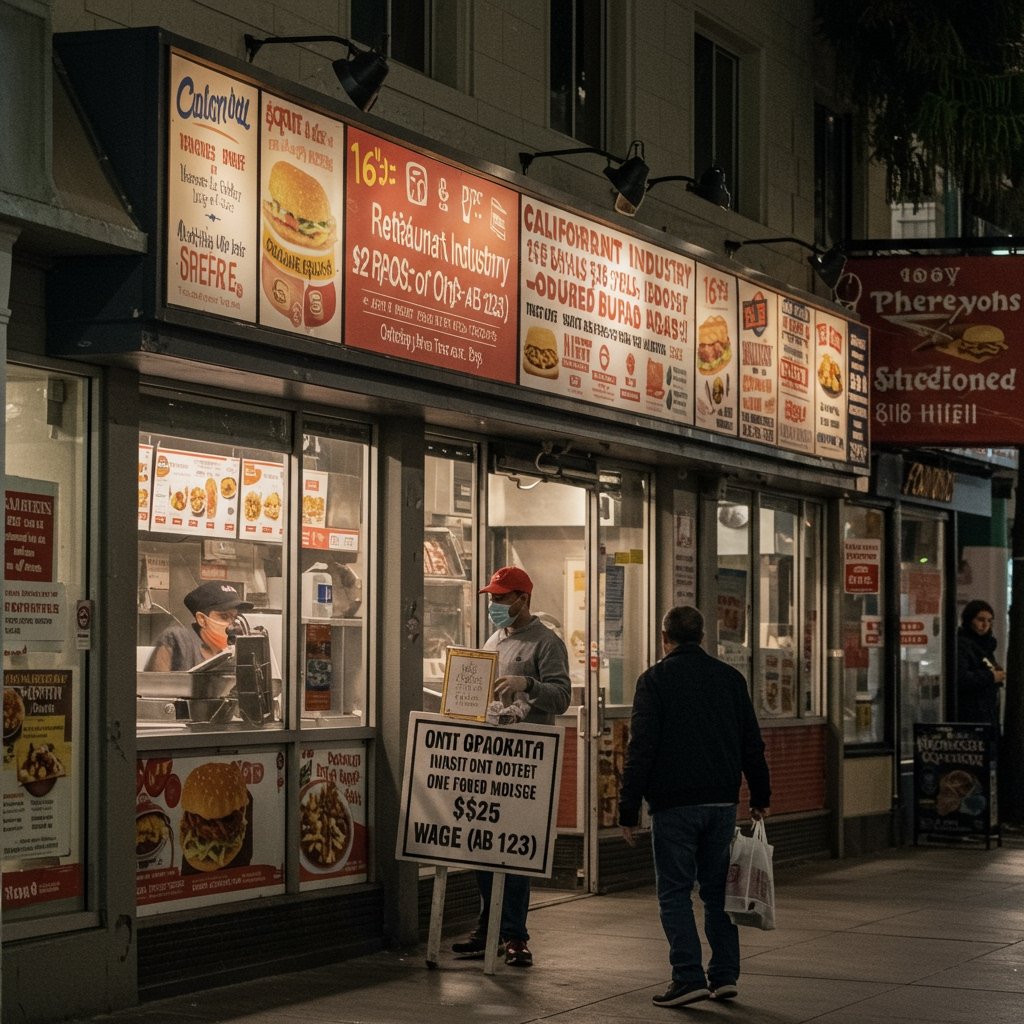California Restaurant Industry Unleashes Strong Opposition to Proposed $25 Fast Food Minimum Wage Bill
SACRAMENTO, CA – Leading industry advocacy groups across California have issued forceful condemnations of a new legislative proposal that aims to significantly increase the minimum wage for fast food workers. The California Restaurant Association (CRA) and various state chapters of the National Restaurant Association (NRA) today voiced their strident opposition to Assembly Bill 123 (AB 123), which seeks to mandate a minimum wage of $25 per hour specifically for employees within the state’s fast food sector.
The proposed measure has ignited fierce debate shortly after the implementation of the existing Fast Food Accountability and Standards Recovery Act, commonly known as the FAST Act. Under the FAST Act, a council was established to set standards and wages for fast food workers, recently resulting in a statewide minimum wage increase to $20 per hour for the industry, effective April 1, 2024. Critics argue that introducing another significant wage mandate via AB 123 so soon after the FAST Act’s framework began implementation is premature and economically disruptive.
Industry representatives, including spokespersons for the CRA and NRA state chapters, argue that AB 123, if passed, would have devastating consequences for California’s quick-service restaurant sector. They contend that mandating a $25 hourly wage would place an unsustainable financial burden on businesses already grappling with rising operating costs, inflation, and the recent wage adjustments under the FAST Act. The associations cited concerns that this substantial wage hike would cripple the state’s quick-service sector, potentially forcing widespread and significant layoffs as businesses seek to offset the increased labor costs.
Beyond the direct impact on employment, the restaurant groups warned of inevitable price hikes that would disproportionately impact consumers. They argue that restaurants, operating on notoriously thin margins, would have no choice but to pass the bulk of these increased costs onto customers, making fast food less affordable for many Californians who rely on it as an accessible dining option. This, they suggest, could lead to decreased customer traffic, further exacerbating financial pressures on businesses.
Challenges for Independent Franchisees
A particular point of concern highlighted by the associations is the plight of independent franchisees. Many fast food establishments in California are owned and operated by local entrepreneurs who hold franchise agreements with larger national chains. These franchisees often operate on even thinner margins than corporate-owned locations and may lack the expansive financial buffers of larger corporations. The CRA and NRA chapters expressed grave concerns that independent franchisees could face insurmountable financial pressure under a $25 minimum wage. This could lead to a wave of business closures across the state, jeopardizing not only the livelihoods of the owners but also eliminating jobs for thousands of employees and reducing dining options in communities.
The associations emphasized that the quick-service industry encompasses a wide range of business models, and a one-size-fits-all $25 mandate fails to account for the diverse economic realities faced by different establishments, particularly small, independently owned franchise locations.
Lobbying Efforts Escalate in Sacramento
In response to the introduction and progression of AB 123, lobbying efforts are reportedly escalating significantly in Sacramento. The California Restaurant Association and NRA state chapters, along with their allies in the business community, are actively engaging with state legislators. Their efforts are specifically targeting key legislative committees where AB 123 must pass before it can advance further in the legislative process.
The objective of this intensified lobbying campaign is clear: to block the bill’s progression before scheduled hearings next month. Industry representatives are holding meetings, submitting testimony, and organizing grassroots efforts to educate lawmakers about their perceived negative economic impacts of the proposed $25 wage. They are urging legislators to consider the recent implementation of the FAST Act and allow time for its effects to be evaluated before imposing a new, substantially higher wage floor.
The associations argue that stability and predictability are crucial for businesses to plan and invest. Introducing AB 123 so soon after the FAST Act, they contend, creates an environment of uncertainty that hinders business growth and recovery.
Looking Ahead
As the legislative session continues, the fate of AB 123 remains uncertain. The powerful advocacy of the California Restaurant Association and the National Restaurant Association state chapters represents a significant hurdle for the bill’s proponents. Their arguments centering on potential layoffs, price increases, consumer impact, and franchisee vulnerability are central to the debate unfolding in Sacramento. The scheduled committee hearings next month are expected to be a critical juncture for the bill, where industry opposition will be formally heard and debated against the arguments put forth by proponents of the wage increase, who typically cite the need for workers to earn a living wage in a high-cost state like California. The outcome will have profound implications for California’s fast food industry, its employees, and its consumers.



















